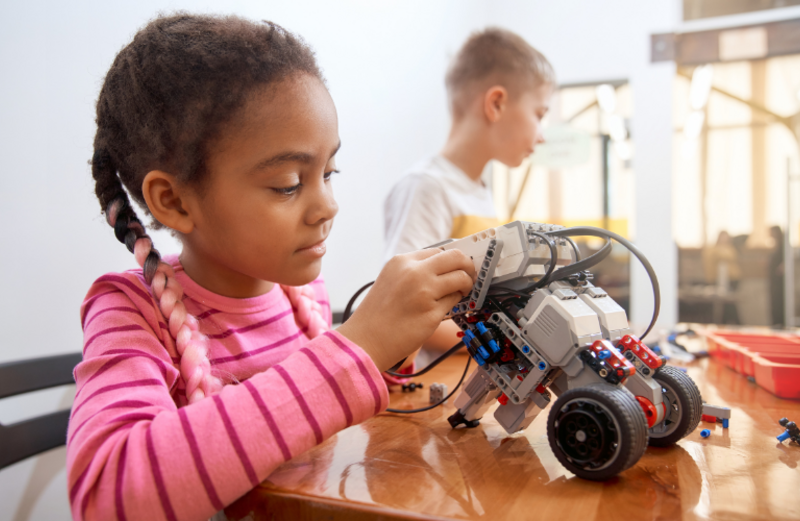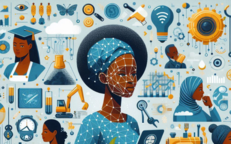Introducing Robotics Into The African Educational Curriculum

This is the 7th post in a blog series to be published in 2024 by the APET Secretariat on behalf of the AU High-Level Panel on Emerging Technologies (APET)
The African Union (AU) has prioritised education as the theme for this year stating, “Educate an African fit for the 21st Century.” This theme underscores the importance of education as a driving force for progress and development across the African continent. However, many children in impoverished AU Member States have limited access to quality education, highlighting the need for resilient and inclusive educational institutions.[1] This vision of the theme aligns with AU’s Agenda 2063, the continent’s development blueprint, which aims to empower every African to reach their full potential and contribute meaningfully to global society. Central to this growth blueprint is a focus on engineering and other related fields, which serve as a foundation for significant development strides.
Despite progress made by African countries in improving their education systems, the continent continues to face numerous challenges, including a lack of basic infrastructure in many schools, such as classrooms, desks, power, and clean water, which hampers the learning environment. There is also a shortage of disqualified teachers in many countries, compounded by inadequate training, low remuneration, and unfavourable working conditions, which affect the quality of education. Disparities in access to education persist between regions, rural and urban areas, and genders, with factors like poverty, cultural norms, early marriage, and long distances to school hindering access, particularly for girls. Furthermore, the curricula in some African countries may not be relevant to students, the local and national landscape, or aligned with global standards.
Evidently, education is the bedrock of societal progress and sustainability, particularly in Africa, a continent known for its diversity and vitality. Its impact extends beyond basic literacy skills, offering opportunities for governments to promote social cohesion, bolster economic resilience, and unleash a wave of creativity. Africa can, therefore, effectively address its complex challenges by harnessing the transformative power of education, which not only preserves the continent’s rich cultural heritage but also equips the upcoming generation of leaders with the skills necessary to thrive in a rapidly evolving global landscape.[2]
In recent years, the incorporation of robotics into modern classrooms has significantly increased, providing students with hands-on experience and practical exposure to STEM (science, technology, engineering, and mathematics) education.[3] Introducing robotics into educational institutions holds great promise for African children, providing them with opportunities to enhance their creativity, critical thinking, and problem-solving abilities.[4] However, while incorporating robotics in educational curricula has gained momentum worldwide, African schools have yet to fully embrace its potential. Education plays a crucial role in unlocking this potential by nurturing creativity and problem-solving skills, essential qualities for driving innovation and propelling African countries onto the global stage.
The African Union High-Level Panel on Emerging Technologies (APET) asserts that integrating robotics education into African schools can revolutionise learning, empower youth, and drive economic growth across the continent. Educational robotics empowers students to become creators rather than just users of technology, fostering confidence in their digital skills and hands-on engagement with technology. APET acknowledges that Africa is home to a vibrant and youthful population, brimming with untapped potential. Therefore, incorporating robotics into African schools offers a unique opportunity to cultivate these young minds, fostering innovation, technical skills, and economic growth. By providing learners with practical skills and a new perspective, incorporating robotics in the educational curriculum enables them to unlock the innovative potential to address the wide-ranging socio-economic challenges facing Africa.[5]
APET notes that robotics education boosts STEM learning and develops 21st-century skills such as computational thinking and digital literacy, preparing students for future jobs. Additionally, robotics education fosters innovation and entrepreneurship, empowering students to address local challenges in agriculture, healthcare, and environmental sustainability. Robotics programmes also have social impacts, bridging gender gaps in STEM fields and building confidence among students. However, challenges such as infrastructure limitations, low teacher training, and affordability need to be addressed. Thus, collaborative efforts from governments, educational institutions, non-governmental organisations, and the private sector are crucial to successfully integrating robotics into African schools.[6]
Several examples highlight the potential benefits and opportunities that robotics education can bring to African students. For instance, in Ghana, the Ghana Robotics Academy empowers young girls through robotics education, with students participating in international competitions.[7] Similarly, Rwanda launched its Mastercard Foundation Rwanda Coding Academy, integrating robotics education to equip students with skills for innovative solutions.[8] South Africa is leading a robotics revolution in education, recognising these skills’ crucial role in preparing students for the digital age. In South Africa, schools like the Oprah Winfrey Leadership Academy have introduced robotics programmes, encouraging creativity and problem-solving abilities among students.[9] Government initiatives such as the Department of Basic Education's Coding and Robotics Curriculum provide a structured approach to integrating robotics and coding concepts into school lessons.[10]
The Digital Skills Institute (DSI), launched in 2019, empowers educators with advanced training in robotics and coding, enabling them to guide students effectively. Organisations such as the RoboCup Junior South Africa host robotics competitions for young learners, fostering their passion and honing their critical thinking skills.[11] Beyond the classroom, Robotics Education South Africa (RESA) collaborates with schools and industry partners to create a supportive environment for learning and innovation through workshops and training programmes. Furthermore, the Oprah Winfrey Leadership Academy, demonstrate the impact of robotics education on fostering creativity and problem-solving abilities. These initiatives are laying the groundwork for a future generation of tech-savvy South Africans, equipping them with the skills needed for future STEM careers.[12]
APET acknowledges the need to tackle challenges related to integrating robotics education into curricula and harnessing its transformative potential. The panel recommends that countries implement a comprehensive roadmap comprising policy recommendations, regulatory frameworks, investment opportunities, and strategies to showcase the economic value of robotics education. This multifaceted approach ensures a structured and coordinated effort to overcome barriers and maximise the benefits of robotics education across the continent.
Policy recommendations include establishing national robotics education strategies, developing teacher training programmes, fostering public-private partnerships, promoting open educational resources, and ensuring equity and inclusion in access to robotics education. Meanwhile, regulatory frameworks should focus on standardising equipment, ensuring data privacy and security, and facilitating industry collaboration. Building a framework for robotics education in Africa requires investments in digital infrastructure development, the production of low-cost robotics kits, organising robotics competitions, and development of online learning platforms. Demonstrating the economic value of robotics education involves highlighting its role in skills development for future jobs, fostering entrepreneurship and innovation, and showcasing success stories of students developing robotics solutions for local challenges. By implementing these recommendations, African Union Member States can harness the potential of robotics education to drive economic growth, social progress, and a brighter future for the continent, empowering Africa’s young minds to lead the way towards a future full of possibilities.
In conclusion, robotics education is essential for equipping African children and youth with the skills and knowledge needed to thrive in the increasingly technology-driven 21st century. As the world becomes increasingly reliant on technology, robotics education offers a powerful teaching methodology that empowers young people to shape their futures and prepares them for the challenges ahead.
Featured Bloggers – APET Secretariat
Aggrey Ambali
Justina Dugbazah – The Sahara Institute, Accra, Ghana
Barbara Glover
Bhekani Mbuli – University of Johannesburg
Chifundo Kungade
Nhlawulo Shikwambane
[1] https://www.dw.com/en/africa-right-to-education-remains-a-challenge/a-60518000.
[2] https://www.worldbank.org/en/region/afr/brief/education.
[3] Aris, Nuria & Orcos, Lara. (2019). Educational Robotics in the Stage of Secondary Education: Empirical Study on Motivation and STEM Skills. Education Sciences. 9. 73. 10.3390/educsci9020073.
[4] Khine, Myint. (2017). Robotics in STEM Education: Redesigning the Learning Experience. 10.1007/978-3-319-57786-9.
[5] https://www.unesco.org/en/articles/unlocking-africas-potential-investing-stem-education.
[6] Screpanti, Laura & Miotti, Beatrice & Monteriù, Andrea. (2021). Robotics in Education: A Smart and Innovative Approach to the Challenges of the 21st Century. 10.1007/978-3-030-77040-2_3.
[7] https://weetracker.com/2019/05/28/ghanaian-schoolgirls-win-robotics-competition/.
[8] https://mastercardfdn.org/wp-content/uploads/2023/04/EdTech-landscape-in-Rwanda.pdf.
[9] https://african.land/blog/article/oprah-winfreys-school-for-girls-in-south-africa-why-it-matters-b73.
[10] Mihai, Maryke & Mapheto, Doctor. (2024). Teachers' and Learners' Acceptance of the Use of Robotics in the Intermediate Phase. 10.4018/979-8-3693-1066-3.ch011.
[11] https://mykurasa.com/2024/05/empowering-the-future-coding-and-robotics-centre-unveiled-in-nakuru/.
[12] https://www.adeanet.org/en/blogs/training-african-youth-coding-robotics-has-never-been-more-urgent.


